Asia Pacific International College: HR Career Analysis Essay
VerifiedAdded on 2023/06/08
|11
|2973
|383
Essay
AI Summary
This essay, written by a student at Asia Pacific International College (APIC), analyzes the required subjects and skills for a career as a Human Resource Officer. The student outlines the courses needed, including business communication, computer systems, management theory, and organizational development, and identifies which are offered by APIC's Bachelor of Business program. The essay also assesses the student's strengths, such as strong interpersonal and communication skills, and weaknesses, like conflict resolution, proposing strategies to overcome them through further study and practice. The student emphasizes the importance of continuous skill development, including presentation skills, interview techniques, and understanding employee relations, to achieve their career goals. The essay concludes that APIC's curriculum provides a solid foundation for developing the necessary competencies for an HR career.
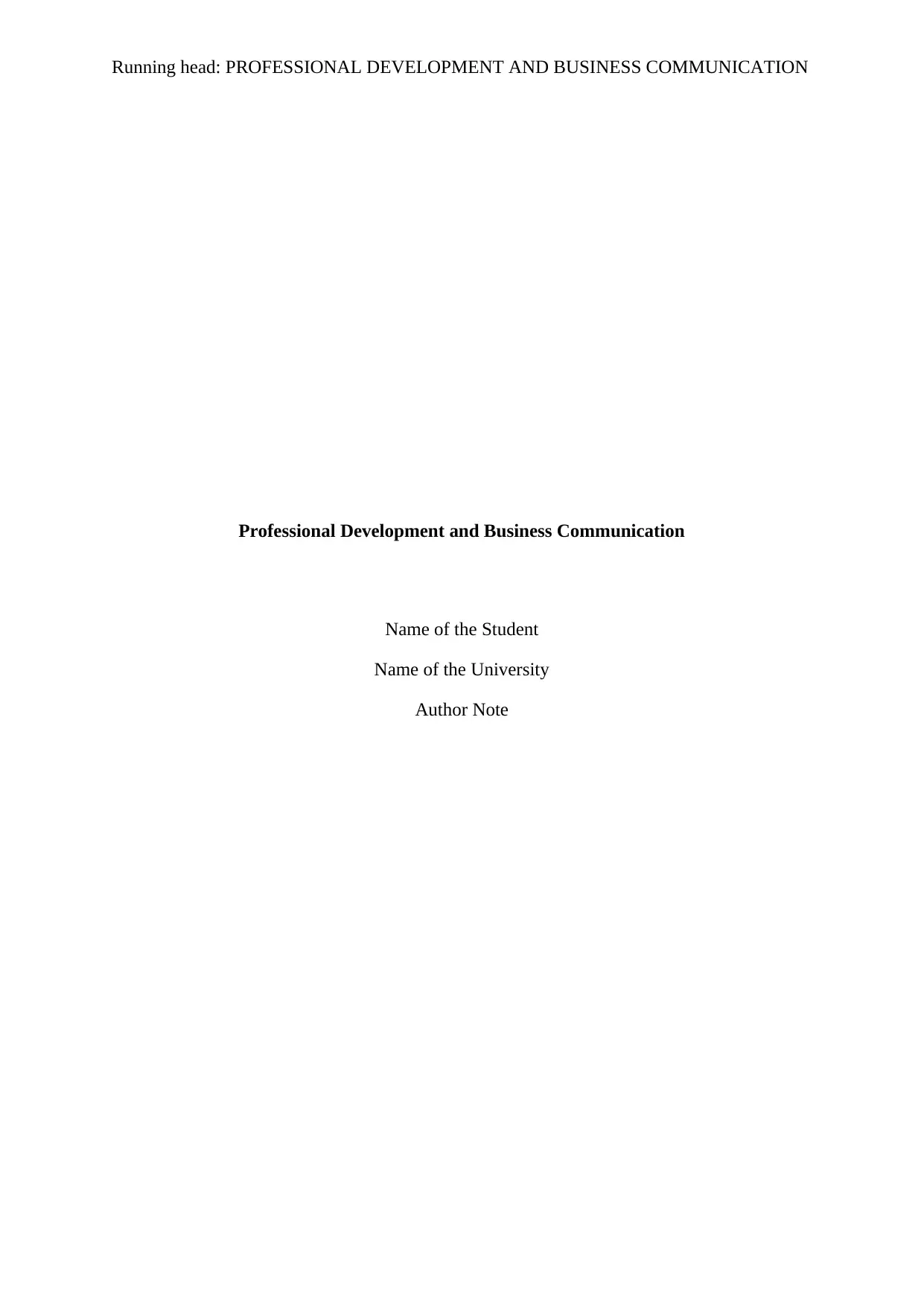
Running head: PROFESSIONAL DEVELOPMENT AND BUSINESS COMMUNICATION
Professional Development and Business Communication
Name of the Student
Name of the University
Author Note
Professional Development and Business Communication
Name of the Student
Name of the University
Author Note
Paraphrase This Document
Need a fresh take? Get an instant paraphrase of this document with our AI Paraphraser
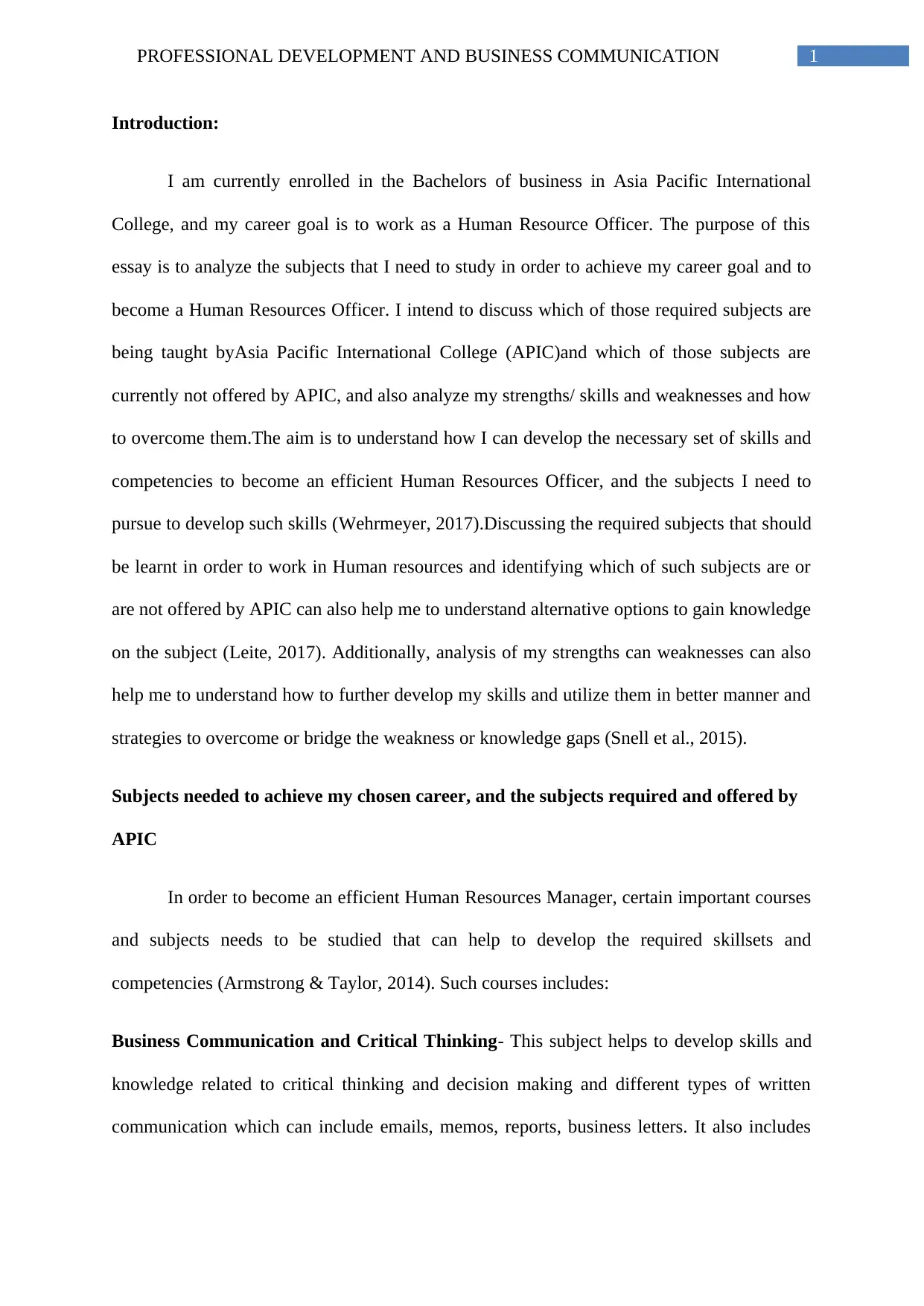
1PROFESSIONAL DEVELOPMENT AND BUSINESS COMMUNICATION
Introduction:
I am currently enrolled in the Bachelors of business in Asia Pacific International
College, and my career goal is to work as a Human Resource Officer. The purpose of this
essay is to analyze the subjects that I need to study in order to achieve my career goal and to
become a Human Resources Officer. I intend to discuss which of those required subjects are
being taught byAsia Pacific International College (APIC)and which of those subjects are
currently not offered by APIC, and also analyze my strengths/ skills and weaknesses and how
to overcome them.The aim is to understand how I can develop the necessary set of skills and
competencies to become an efficient Human Resources Officer, and the subjects I need to
pursue to develop such skills (Wehrmeyer, 2017).Discussing the required subjects that should
be learnt in order to work in Human resources and identifying which of such subjects are or
are not offered by APIC can also help me to understand alternative options to gain knowledge
on the subject (Leite, 2017). Additionally, analysis of my strengths can weaknesses can also
help me to understand how to further develop my skills and utilize them in better manner and
strategies to overcome or bridge the weakness or knowledge gaps (Snell et al., 2015).
Subjects needed to achieve my chosen career, and the subjects required and offered by
APIC
In order to become an efficient Human Resources Manager, certain important courses
and subjects needs to be studied that can help to develop the required skillsets and
competencies (Armstrong & Taylor, 2014). Such courses includes:
Business Communication and Critical Thinking- This subject helps to develop skills and
knowledge related to critical thinking and decision making and different types of written
communication which can include emails, memos, reports, business letters. It also includes
Introduction:
I am currently enrolled in the Bachelors of business in Asia Pacific International
College, and my career goal is to work as a Human Resource Officer. The purpose of this
essay is to analyze the subjects that I need to study in order to achieve my career goal and to
become a Human Resources Officer. I intend to discuss which of those required subjects are
being taught byAsia Pacific International College (APIC)and which of those subjects are
currently not offered by APIC, and also analyze my strengths/ skills and weaknesses and how
to overcome them.The aim is to understand how I can develop the necessary set of skills and
competencies to become an efficient Human Resources Officer, and the subjects I need to
pursue to develop such skills (Wehrmeyer, 2017).Discussing the required subjects that should
be learnt in order to work in Human resources and identifying which of such subjects are or
are not offered by APIC can also help me to understand alternative options to gain knowledge
on the subject (Leite, 2017). Additionally, analysis of my strengths can weaknesses can also
help me to understand how to further develop my skills and utilize them in better manner and
strategies to overcome or bridge the weakness or knowledge gaps (Snell et al., 2015).
Subjects needed to achieve my chosen career, and the subjects required and offered by
APIC
In order to become an efficient Human Resources Manager, certain important courses
and subjects needs to be studied that can help to develop the required skillsets and
competencies (Armstrong & Taylor, 2014). Such courses includes:
Business Communication and Critical Thinking- This subject helps to develop skills and
knowledge related to critical thinking and decision making and different types of written
communication which can include emails, memos, reports, business letters. It also includes
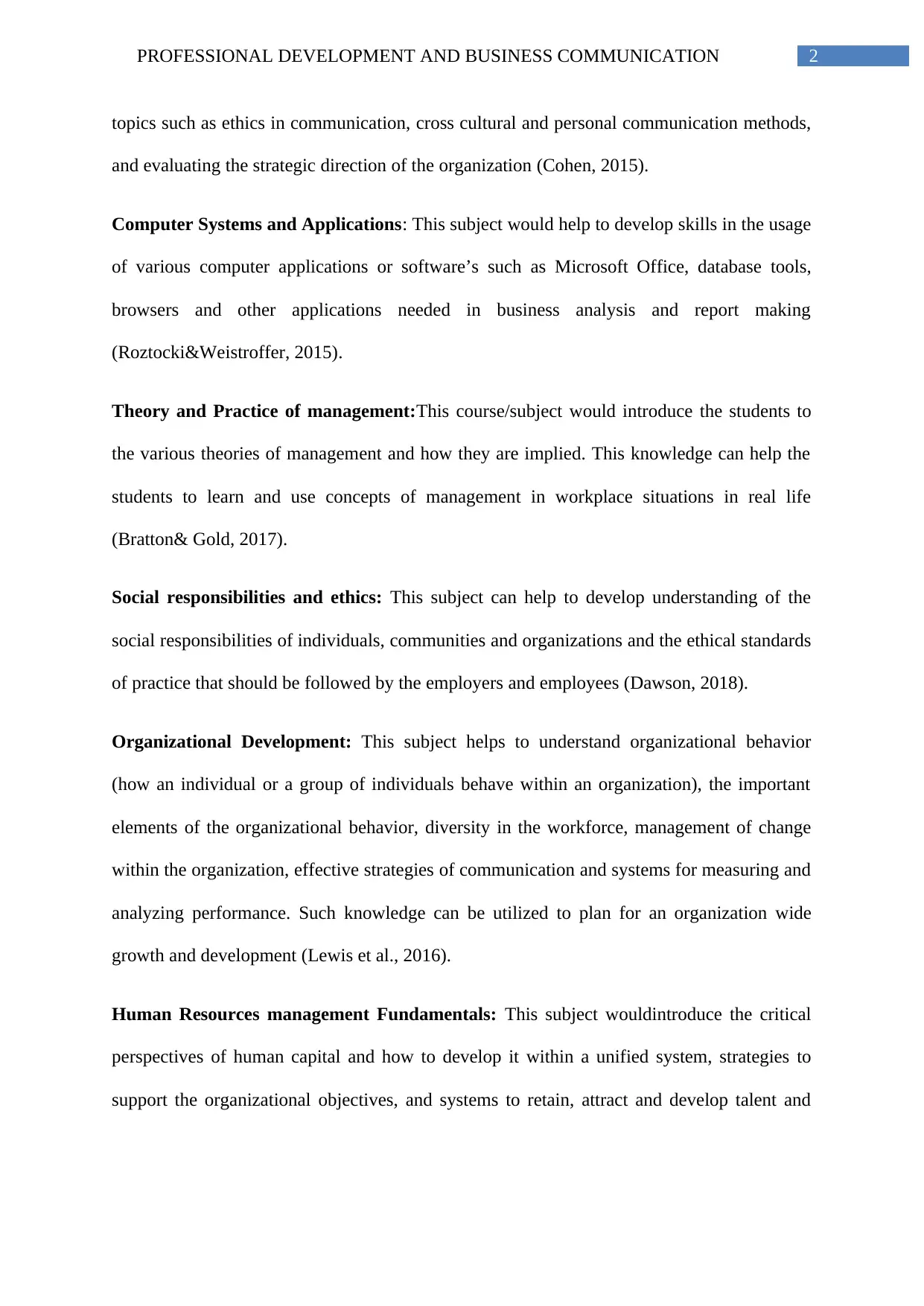
2PROFESSIONAL DEVELOPMENT AND BUSINESS COMMUNICATION
topics such as ethics in communication, cross cultural and personal communication methods,
and evaluating the strategic direction of the organization (Cohen, 2015).
Computer Systems and Applications: This subject would help to develop skills in the usage
of various computer applications or software’s such as Microsoft Office, database tools,
browsers and other applications needed in business analysis and report making
(Roztocki&Weistroffer, 2015).
Theory and Practice of management:This course/subject would introduce the students to
the various theories of management and how they are implied. This knowledge can help the
students to learn and use concepts of management in workplace situations in real life
(Bratton& Gold, 2017).
Social responsibilities and ethics: This subject can help to develop understanding of the
social responsibilities of individuals, communities and organizations and the ethical standards
of practice that should be followed by the employers and employees (Dawson, 2018).
Organizational Development: This subject helps to understand organizational behavior
(how an individual or a group of individuals behave within an organization), the important
elements of the organizational behavior, diversity in the workforce, management of change
within the organization, effective strategies of communication and systems for measuring and
analyzing performance. Such knowledge can be utilized to plan for an organization wide
growth and development (Lewis et al., 2016).
Human Resources management Fundamentals: This subject wouldintroduce the critical
perspectives of human capital and how to develop it within a unified system, strategies to
support the organizational objectives, and systems to retain, attract and develop talent and
topics such as ethics in communication, cross cultural and personal communication methods,
and evaluating the strategic direction of the organization (Cohen, 2015).
Computer Systems and Applications: This subject would help to develop skills in the usage
of various computer applications or software’s such as Microsoft Office, database tools,
browsers and other applications needed in business analysis and report making
(Roztocki&Weistroffer, 2015).
Theory and Practice of management:This course/subject would introduce the students to
the various theories of management and how they are implied. This knowledge can help the
students to learn and use concepts of management in workplace situations in real life
(Bratton& Gold, 2017).
Social responsibilities and ethics: This subject can help to develop understanding of the
social responsibilities of individuals, communities and organizations and the ethical standards
of practice that should be followed by the employers and employees (Dawson, 2018).
Organizational Development: This subject helps to understand organizational behavior
(how an individual or a group of individuals behave within an organization), the important
elements of the organizational behavior, diversity in the workforce, management of change
within the organization, effective strategies of communication and systems for measuring and
analyzing performance. Such knowledge can be utilized to plan for an organization wide
growth and development (Lewis et al., 2016).
Human Resources management Fundamentals: This subject wouldintroduce the critical
perspectives of human capital and how to develop it within a unified system, strategies to
support the organizational objectives, and systems to retain, attract and develop talent and
⊘ This is a preview!⊘
Do you want full access?
Subscribe today to unlock all pages.

Trusted by 1+ million students worldwide
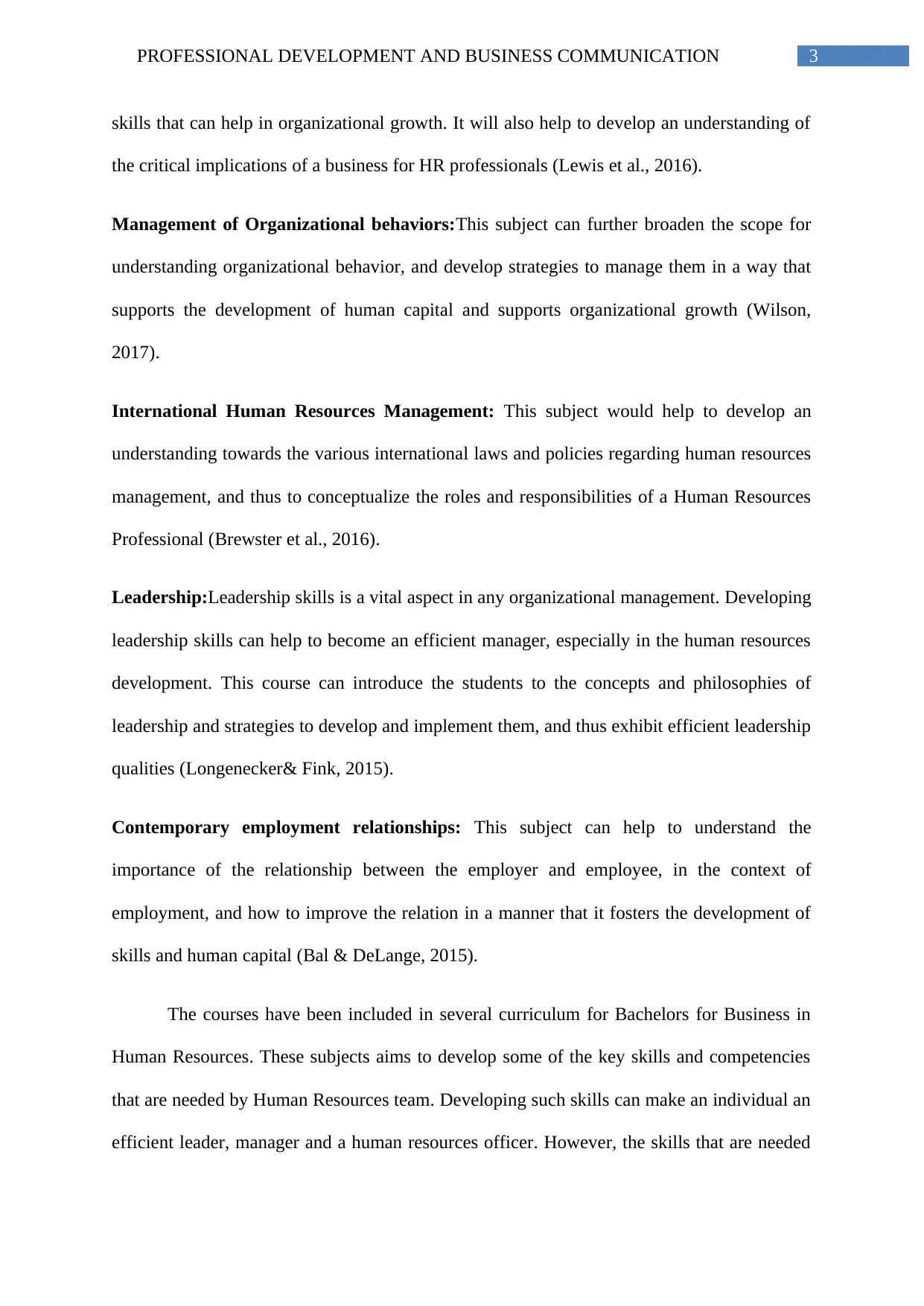
3PROFESSIONAL DEVELOPMENT AND BUSINESS COMMUNICATION
skills that can help in organizational growth. It will also help to develop an understanding of
the critical implications of a business for HR professionals (Lewis et al., 2016).
Management of Organizational behaviors:This subject can further broaden the scope for
understanding organizational behavior, and develop strategies to manage them in a way that
supports the development of human capital and supports organizational growth (Wilson,
2017).
International Human Resources Management: This subject would help to develop an
understanding towards the various international laws and policies regarding human resources
management, and thus to conceptualize the roles and responsibilities of a Human Resources
Professional (Brewster et al., 2016).
Leadership:Leadership skills is a vital aspect in any organizational management. Developing
leadership skills can help to become an efficient manager, especially in the human resources
development. This course can introduce the students to the concepts and philosophies of
leadership and strategies to develop and implement them, and thus exhibit efficient leadership
qualities (Longenecker& Fink, 2015).
Contemporary employment relationships: This subject can help to understand the
importance of the relationship between the employer and employee, in the context of
employment, and how to improve the relation in a manner that it fosters the development of
skills and human capital (Bal & DeLange, 2015).
The courses have been included in several curriculum for Bachelors for Business in
Human Resources. These subjects aims to develop some of the key skills and competencies
that are needed by Human Resources team. Developing such skills can make an individual an
efficient leader, manager and a human resources officer. However, the skills that are needed
skills that can help in organizational growth. It will also help to develop an understanding of
the critical implications of a business for HR professionals (Lewis et al., 2016).
Management of Organizational behaviors:This subject can further broaden the scope for
understanding organizational behavior, and develop strategies to manage them in a way that
supports the development of human capital and supports organizational growth (Wilson,
2017).
International Human Resources Management: This subject would help to develop an
understanding towards the various international laws and policies regarding human resources
management, and thus to conceptualize the roles and responsibilities of a Human Resources
Professional (Brewster et al., 2016).
Leadership:Leadership skills is a vital aspect in any organizational management. Developing
leadership skills can help to become an efficient manager, especially in the human resources
development. This course can introduce the students to the concepts and philosophies of
leadership and strategies to develop and implement them, and thus exhibit efficient leadership
qualities (Longenecker& Fink, 2015).
Contemporary employment relationships: This subject can help to understand the
importance of the relationship between the employer and employee, in the context of
employment, and how to improve the relation in a manner that it fosters the development of
skills and human capital (Bal & DeLange, 2015).
The courses have been included in several curriculum for Bachelors for Business in
Human Resources. These subjects aims to develop some of the key skills and competencies
that are needed by Human Resources team. Developing such skills can make an individual an
efficient leader, manager and a human resources officer. However, the skills that are needed
Paraphrase This Document
Need a fresh take? Get an instant paraphrase of this document with our AI Paraphraser
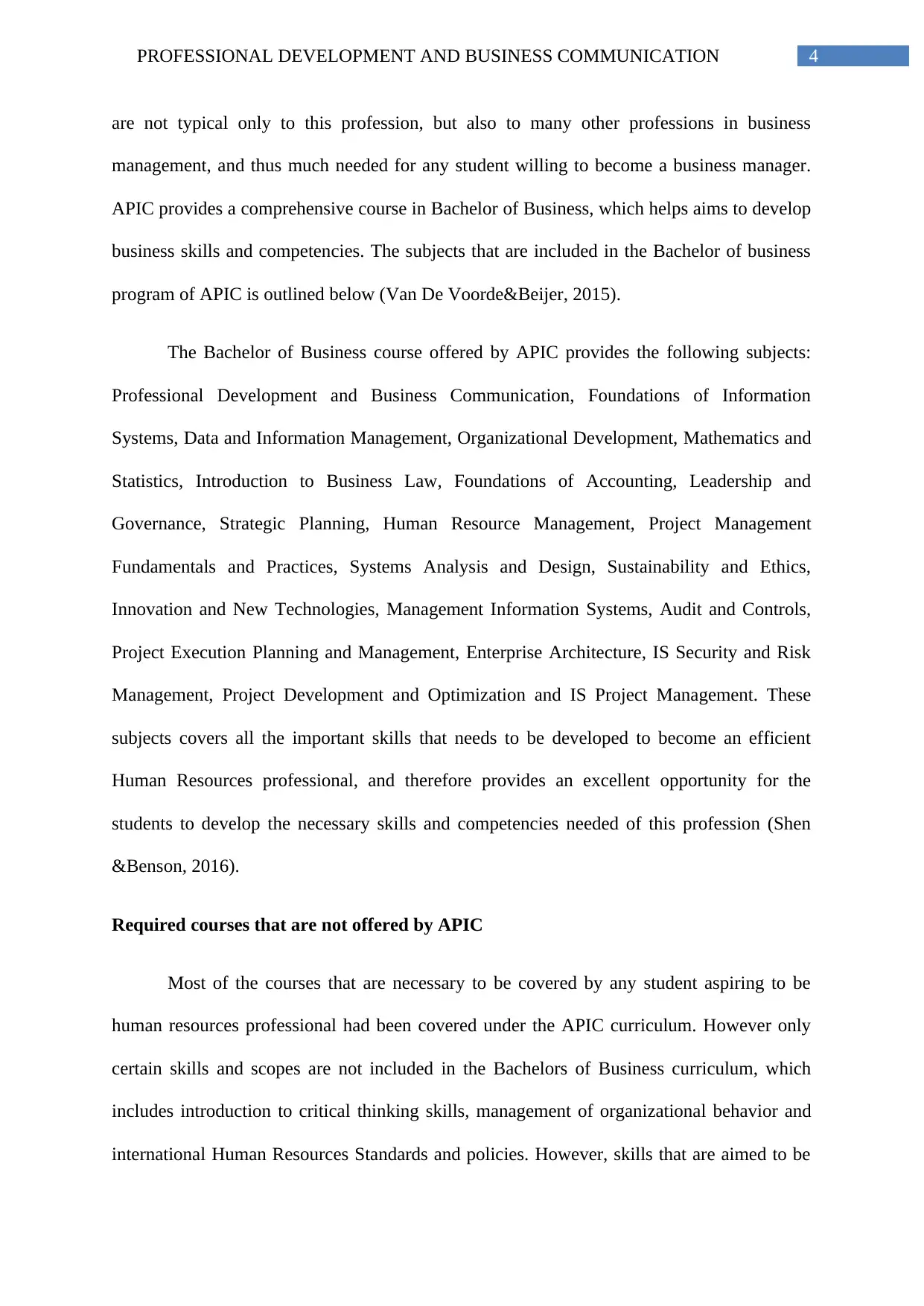
4PROFESSIONAL DEVELOPMENT AND BUSINESS COMMUNICATION
are not typical only to this profession, but also to many other professions in business
management, and thus much needed for any student willing to become a business manager.
APIC provides a comprehensive course in Bachelor of Business, which helps aims to develop
business skills and competencies. The subjects that are included in the Bachelor of business
program of APIC is outlined below (Van De Voorde&Beijer, 2015).
The Bachelor of Business course offered by APIC provides the following subjects:
Professional Development and Business Communication, Foundations of Information
Systems, Data and Information Management, Organizational Development, Mathematics and
Statistics, Introduction to Business Law, Foundations of Accounting, Leadership and
Governance, Strategic Planning, Human Resource Management, Project Management
Fundamentals and Practices, Systems Analysis and Design, Sustainability and Ethics,
Innovation and New Technologies, Management Information Systems, Audit and Controls,
Project Execution Planning and Management, Enterprise Architecture, IS Security and Risk
Management, Project Development and Optimization and IS Project Management. These
subjects covers all the important skills that needs to be developed to become an efficient
Human Resources professional, and therefore provides an excellent opportunity for the
students to develop the necessary skills and competencies needed of this profession (Shen
&Benson, 2016).
Required courses that are not offered by APIC
Most of the courses that are necessary to be covered by any student aspiring to be
human resources professional had been covered under the APIC curriculum. However only
certain skills and scopes are not included in the Bachelors of Business curriculum, which
includes introduction to critical thinking skills, management of organizational behavior and
international Human Resources Standards and policies. However, skills that are aimed to be
are not typical only to this profession, but also to many other professions in business
management, and thus much needed for any student willing to become a business manager.
APIC provides a comprehensive course in Bachelor of Business, which helps aims to develop
business skills and competencies. The subjects that are included in the Bachelor of business
program of APIC is outlined below (Van De Voorde&Beijer, 2015).
The Bachelor of Business course offered by APIC provides the following subjects:
Professional Development and Business Communication, Foundations of Information
Systems, Data and Information Management, Organizational Development, Mathematics and
Statistics, Introduction to Business Law, Foundations of Accounting, Leadership and
Governance, Strategic Planning, Human Resource Management, Project Management
Fundamentals and Practices, Systems Analysis and Design, Sustainability and Ethics,
Innovation and New Technologies, Management Information Systems, Audit and Controls,
Project Execution Planning and Management, Enterprise Architecture, IS Security and Risk
Management, Project Development and Optimization and IS Project Management. These
subjects covers all the important skills that needs to be developed to become an efficient
Human Resources professional, and therefore provides an excellent opportunity for the
students to develop the necessary skills and competencies needed of this profession (Shen
&Benson, 2016).
Required courses that are not offered by APIC
Most of the courses that are necessary to be covered by any student aspiring to be
human resources professional had been covered under the APIC curriculum. However only
certain skills and scopes are not included in the Bachelors of Business curriculum, which
includes introduction to critical thinking skills, management of organizational behavior and
international Human Resources Standards and policies. However, skills that are aimed to be
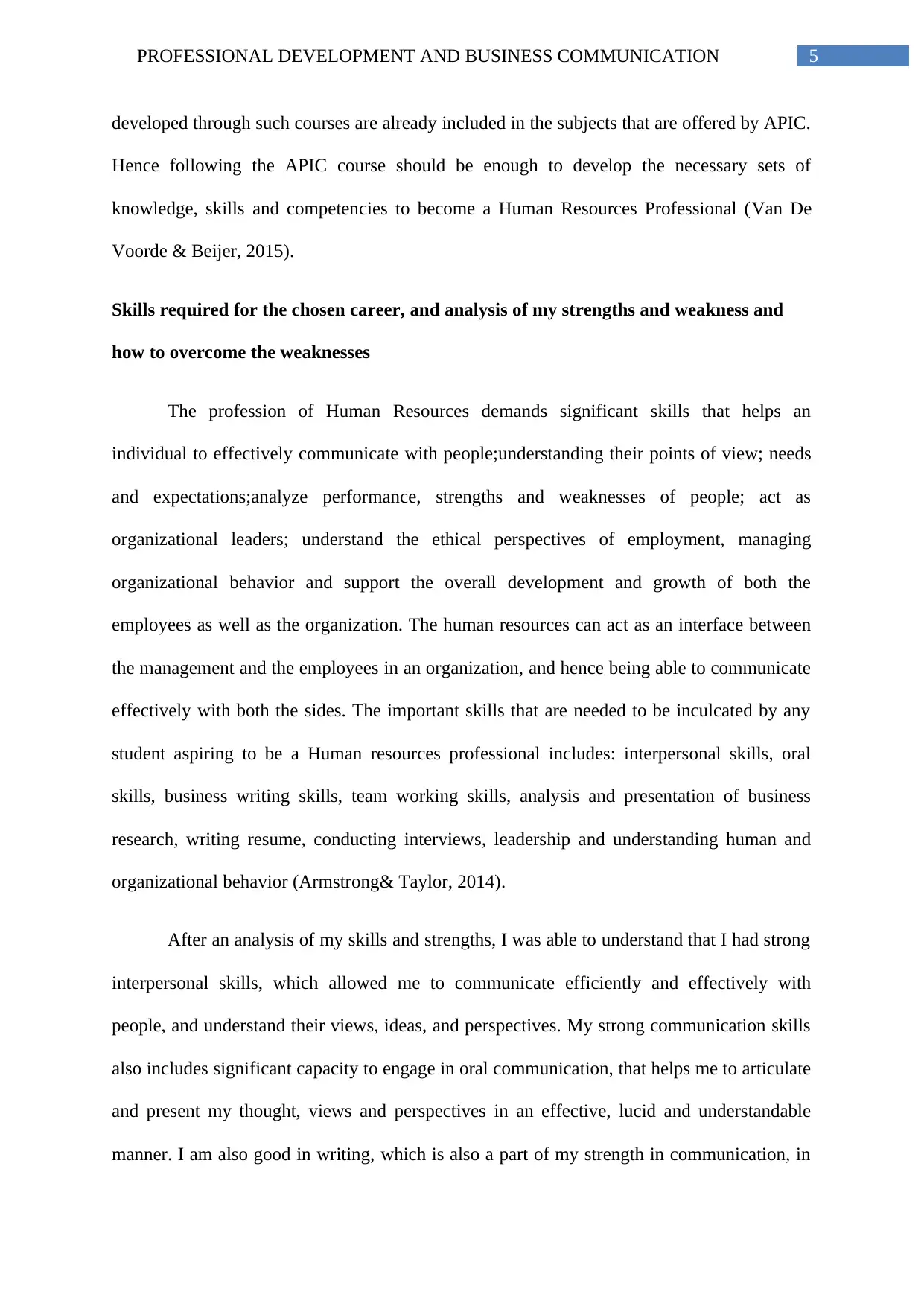
5PROFESSIONAL DEVELOPMENT AND BUSINESS COMMUNICATION
developed through such courses are already included in the subjects that are offered by APIC.
Hence following the APIC course should be enough to develop the necessary sets of
knowledge, skills and competencies to become a Human Resources Professional (Van De
Voorde & Beijer, 2015).
Skills required for the chosen career, and analysis of my strengths and weakness and
how to overcome the weaknesses
The profession of Human Resources demands significant skills that helps an
individual to effectively communicate with people;understanding their points of view; needs
and expectations;analyze performance, strengths and weaknesses of people; act as
organizational leaders; understand the ethical perspectives of employment, managing
organizational behavior and support the overall development and growth of both the
employees as well as the organization. The human resources can act as an interface between
the management and the employees in an organization, and hence being able to communicate
effectively with both the sides. The important skills that are needed to be inculcated by any
student aspiring to be a Human resources professional includes: interpersonal skills, oral
skills, business writing skills, team working skills, analysis and presentation of business
research, writing resume, conducting interviews, leadership and understanding human and
organizational behavior (Armstrong& Taylor, 2014).
After an analysis of my skills and strengths, I was able to understand that I had strong
interpersonal skills, which allowed me to communicate efficiently and effectively with
people, and understand their views, ideas, and perspectives. My strong communication skills
also includes significant capacity to engage in oral communication, that helps me to articulate
and present my thought, views and perspectives in an effective, lucid and understandable
manner. I am also good in writing, which is also a part of my strength in communication, in
developed through such courses are already included in the subjects that are offered by APIC.
Hence following the APIC course should be enough to develop the necessary sets of
knowledge, skills and competencies to become a Human Resources Professional (Van De
Voorde & Beijer, 2015).
Skills required for the chosen career, and analysis of my strengths and weakness and
how to overcome the weaknesses
The profession of Human Resources demands significant skills that helps an
individual to effectively communicate with people;understanding their points of view; needs
and expectations;analyze performance, strengths and weaknesses of people; act as
organizational leaders; understand the ethical perspectives of employment, managing
organizational behavior and support the overall development and growth of both the
employees as well as the organization. The human resources can act as an interface between
the management and the employees in an organization, and hence being able to communicate
effectively with both the sides. The important skills that are needed to be inculcated by any
student aspiring to be a Human resources professional includes: interpersonal skills, oral
skills, business writing skills, team working skills, analysis and presentation of business
research, writing resume, conducting interviews, leadership and understanding human and
organizational behavior (Armstrong& Taylor, 2014).
After an analysis of my skills and strengths, I was able to understand that I had strong
interpersonal skills, which allowed me to communicate efficiently and effectively with
people, and understand their views, ideas, and perspectives. My strong communication skills
also includes significant capacity to engage in oral communication, that helps me to articulate
and present my thought, views and perspectives in an effective, lucid and understandable
manner. I am also good in writing, which is also a part of my strength in communication, in
⊘ This is a preview!⊘
Do you want full access?
Subscribe today to unlock all pages.

Trusted by 1+ million students worldwide
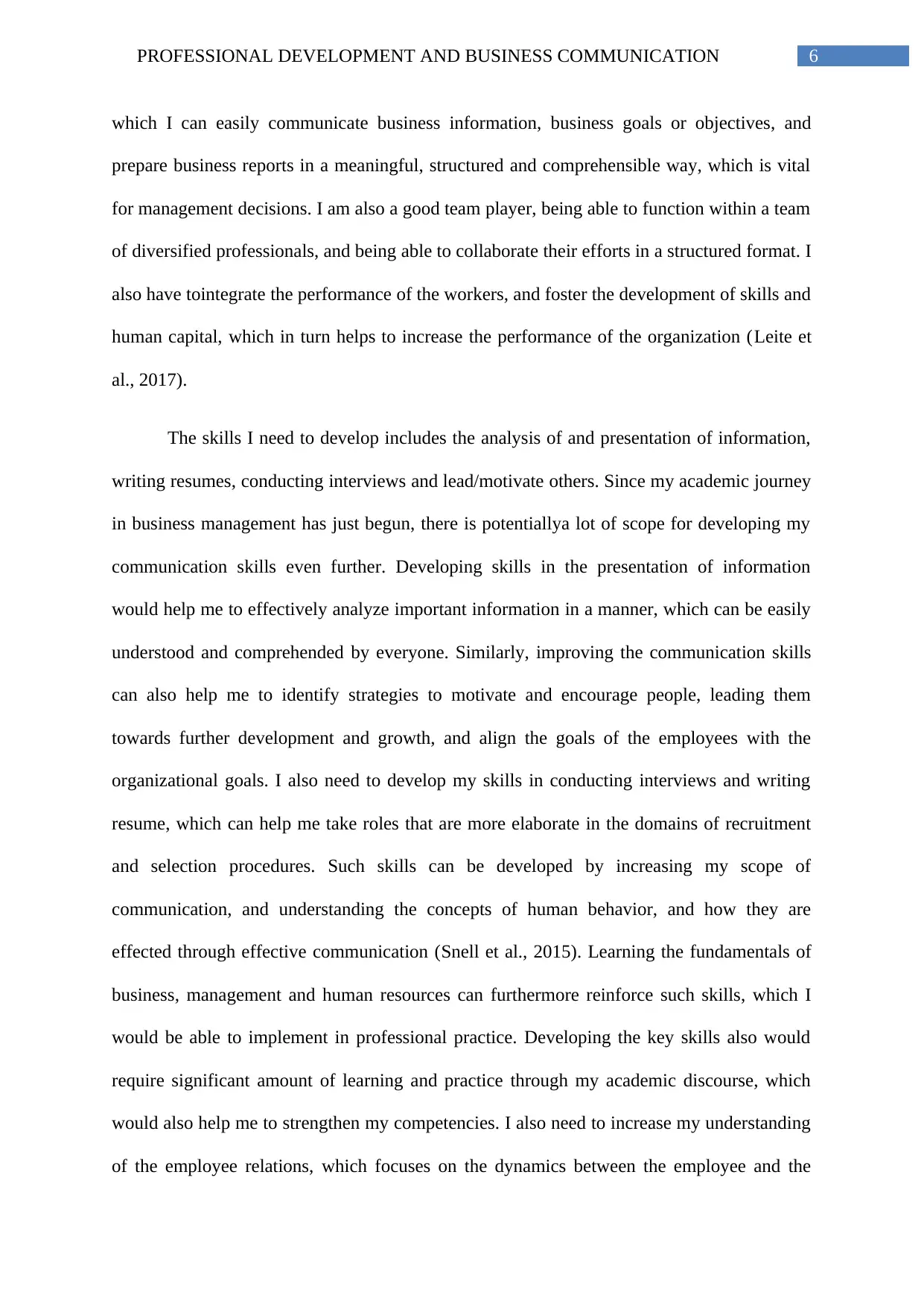
6PROFESSIONAL DEVELOPMENT AND BUSINESS COMMUNICATION
which I can easily communicate business information, business goals or objectives, and
prepare business reports in a meaningful, structured and comprehensible way, which is vital
for management decisions. I am also a good team player, being able to function within a team
of diversified professionals, and being able to collaborate their efforts in a structured format. I
also have tointegrate the performance of the workers, and foster the development of skills and
human capital, which in turn helps to increase the performance of the organization (Leite et
al., 2017).
The skills I need to develop includes the analysis of and presentation of information,
writing resumes, conducting interviews and lead/motivate others. Since my academic journey
in business management has just begun, there is potentiallya lot of scope for developing my
communication skills even further. Developing skills in the presentation of information
would help me to effectively analyze important information in a manner, which can be easily
understood and comprehended by everyone. Similarly, improving the communication skills
can also help me to identify strategies to motivate and encourage people, leading them
towards further development and growth, and align the goals of the employees with the
organizational goals. I also need to develop my skills in conducting interviews and writing
resume, which can help me take roles that are more elaborate in the domains of recruitment
and selection procedures. Such skills can be developed by increasing my scope of
communication, and understanding the concepts of human behavior, and how they are
effected through effective communication (Snell et al., 2015). Learning the fundamentals of
business, management and human resources can furthermore reinforce such skills, which I
would be able to implement in professional practice. Developing the key skills also would
require significant amount of learning and practice through my academic discourse, which
would also help me to strengthen my competencies. I also need to increase my understanding
of the employee relations, which focuses on the dynamics between the employee and the
which I can easily communicate business information, business goals or objectives, and
prepare business reports in a meaningful, structured and comprehensible way, which is vital
for management decisions. I am also a good team player, being able to function within a team
of diversified professionals, and being able to collaborate their efforts in a structured format. I
also have tointegrate the performance of the workers, and foster the development of skills and
human capital, which in turn helps to increase the performance of the organization (Leite et
al., 2017).
The skills I need to develop includes the analysis of and presentation of information,
writing resumes, conducting interviews and lead/motivate others. Since my academic journey
in business management has just begun, there is potentiallya lot of scope for developing my
communication skills even further. Developing skills in the presentation of information
would help me to effectively analyze important information in a manner, which can be easily
understood and comprehended by everyone. Similarly, improving the communication skills
can also help me to identify strategies to motivate and encourage people, leading them
towards further development and growth, and align the goals of the employees with the
organizational goals. I also need to develop my skills in conducting interviews and writing
resume, which can help me take roles that are more elaborate in the domains of recruitment
and selection procedures. Such skills can be developed by increasing my scope of
communication, and understanding the concepts of human behavior, and how they are
effected through effective communication (Snell et al., 2015). Learning the fundamentals of
business, management and human resources can furthermore reinforce such skills, which I
would be able to implement in professional practice. Developing the key skills also would
require significant amount of learning and practice through my academic discourse, which
would also help me to strengthen my competencies. I also need to increase my understanding
of the employee relations, which focuses on the dynamics between the employee and the
Paraphrase This Document
Need a fresh take? Get an instant paraphrase of this document with our AI Paraphraser
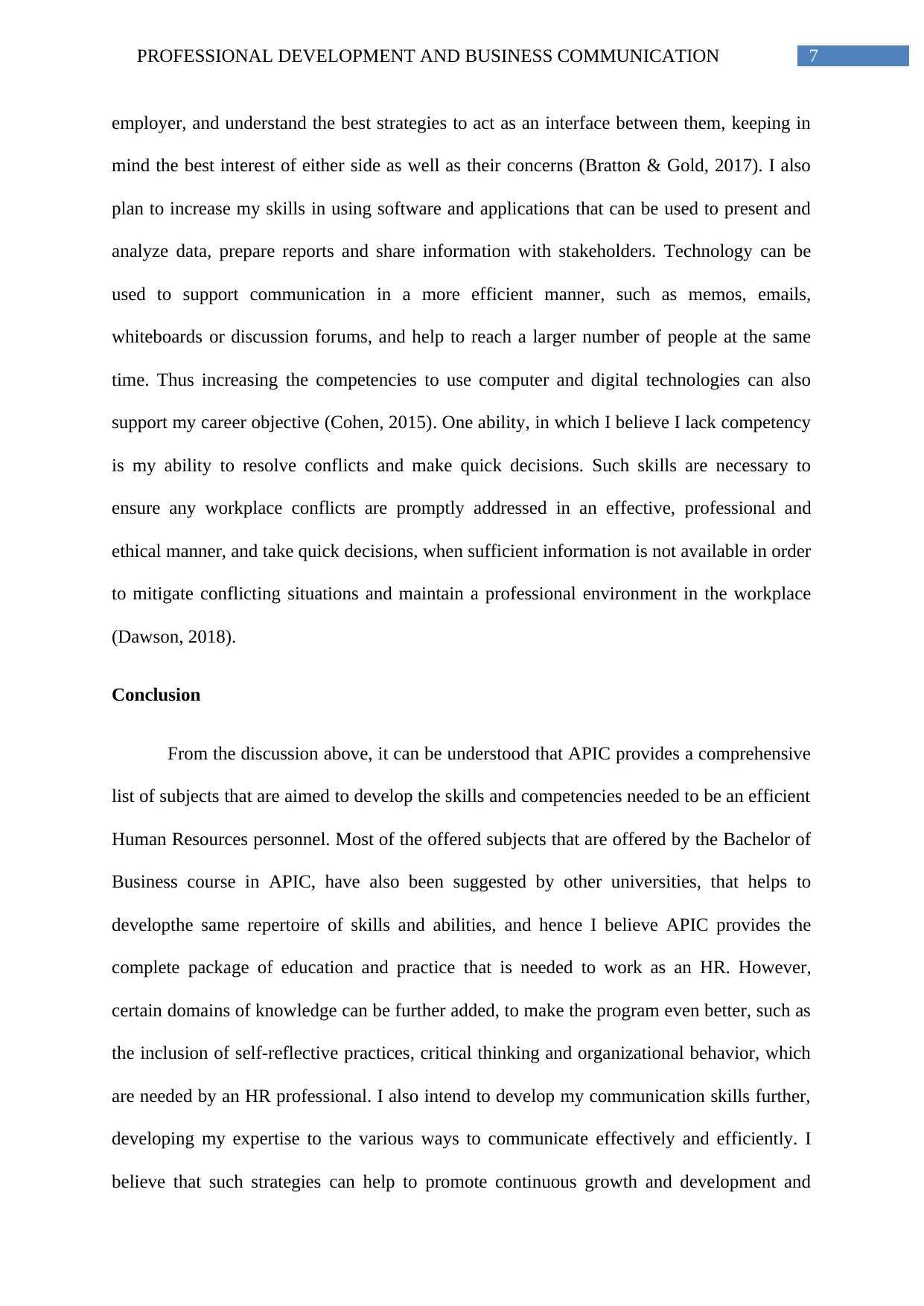
7PROFESSIONAL DEVELOPMENT AND BUSINESS COMMUNICATION
employer, and understand the best strategies to act as an interface between them, keeping in
mind the best interest of either side as well as their concerns (Bratton & Gold, 2017). I also
plan to increase my skills in using software and applications that can be used to present and
analyze data, prepare reports and share information with stakeholders. Technology can be
used to support communication in a more efficient manner, such as memos, emails,
whiteboards or discussion forums, and help to reach a larger number of people at the same
time. Thus increasing the competencies to use computer and digital technologies can also
support my career objective (Cohen, 2015). One ability, in which I believe I lack competency
is my ability to resolve conflicts and make quick decisions. Such skills are necessary to
ensure any workplace conflicts are promptly addressed in an effective, professional and
ethical manner, and take quick decisions, when sufficient information is not available in order
to mitigate conflicting situations and maintain a professional environment in the workplace
(Dawson, 2018).
Conclusion
From the discussion above, it can be understood that APIC provides a comprehensive
list of subjects that are aimed to develop the skills and competencies needed to be an efficient
Human Resources personnel. Most of the offered subjects that are offered by the Bachelor of
Business course in APIC, have also been suggested by other universities, that helps to
developthe same repertoire of skills and abilities, and hence I believe APIC provides the
complete package of education and practice that is needed to work as an HR. However,
certain domains of knowledge can be further added, to make the program even better, such as
the inclusion of self-reflective practices, critical thinking and organizational behavior, which
are needed by an HR professional. I also intend to develop my communication skills further,
developing my expertise to the various ways to communicate effectively and efficiently. I
believe that such strategies can help to promote continuous growth and development and
employer, and understand the best strategies to act as an interface between them, keeping in
mind the best interest of either side as well as their concerns (Bratton & Gold, 2017). I also
plan to increase my skills in using software and applications that can be used to present and
analyze data, prepare reports and share information with stakeholders. Technology can be
used to support communication in a more efficient manner, such as memos, emails,
whiteboards or discussion forums, and help to reach a larger number of people at the same
time. Thus increasing the competencies to use computer and digital technologies can also
support my career objective (Cohen, 2015). One ability, in which I believe I lack competency
is my ability to resolve conflicts and make quick decisions. Such skills are necessary to
ensure any workplace conflicts are promptly addressed in an effective, professional and
ethical manner, and take quick decisions, when sufficient information is not available in order
to mitigate conflicting situations and maintain a professional environment in the workplace
(Dawson, 2018).
Conclusion
From the discussion above, it can be understood that APIC provides a comprehensive
list of subjects that are aimed to develop the skills and competencies needed to be an efficient
Human Resources personnel. Most of the offered subjects that are offered by the Bachelor of
Business course in APIC, have also been suggested by other universities, that helps to
developthe same repertoire of skills and abilities, and hence I believe APIC provides the
complete package of education and practice that is needed to work as an HR. However,
certain domains of knowledge can be further added, to make the program even better, such as
the inclusion of self-reflective practices, critical thinking and organizational behavior, which
are needed by an HR professional. I also intend to develop my communication skills further,
developing my expertise to the various ways to communicate effectively and efficiently. I
believe that such strategies can help to promote continuous growth and development and
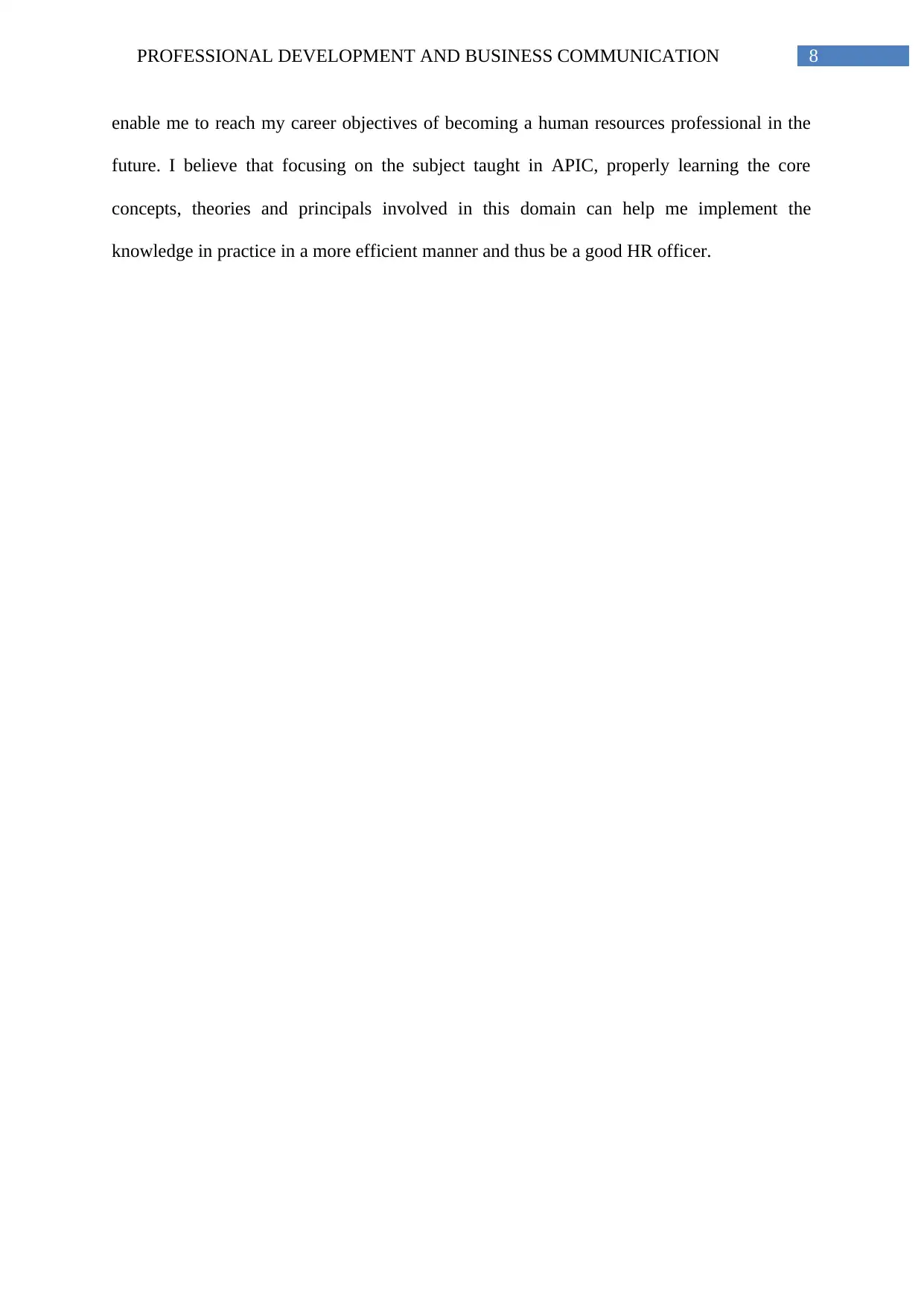
8PROFESSIONAL DEVELOPMENT AND BUSINESS COMMUNICATION
enable me to reach my career objectives of becoming a human resources professional in the
future. I believe that focusing on the subject taught in APIC, properly learning the core
concepts, theories and principals involved in this domain can help me implement the
knowledge in practice in a more efficient manner and thus be a good HR officer.
enable me to reach my career objectives of becoming a human resources professional in the
future. I believe that focusing on the subject taught in APIC, properly learning the core
concepts, theories and principals involved in this domain can help me implement the
knowledge in practice in a more efficient manner and thus be a good HR officer.
⊘ This is a preview!⊘
Do you want full access?
Subscribe today to unlock all pages.

Trusted by 1+ million students worldwide
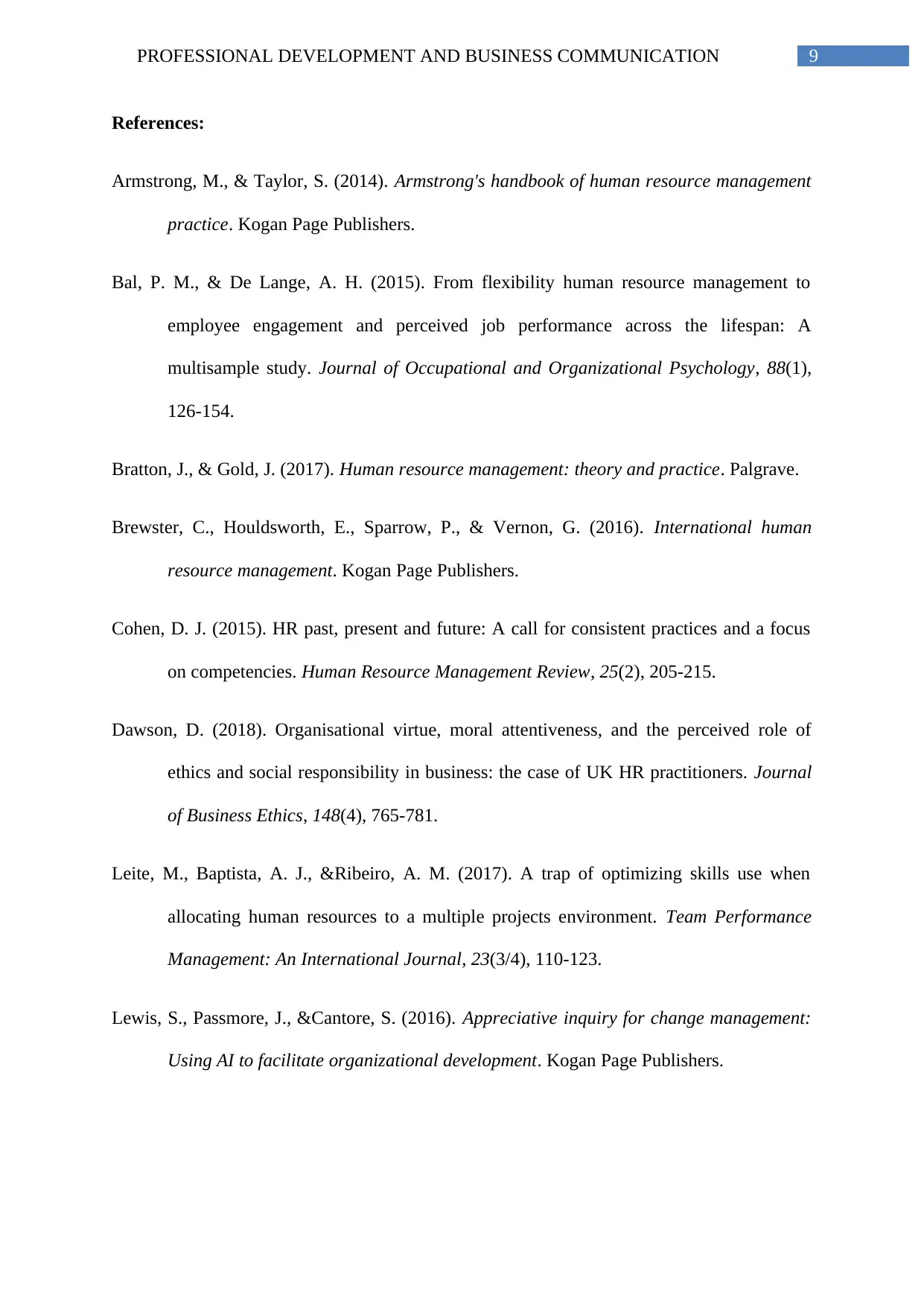
9PROFESSIONAL DEVELOPMENT AND BUSINESS COMMUNICATION
References:
Armstrong, M., & Taylor, S. (2014). Armstrong's handbook of human resource management
practice. Kogan Page Publishers.
Bal, P. M., & De Lange, A. H. (2015). From flexibility human resource management to
employee engagement and perceived job performance across the lifespan: A
multisample study. Journal of Occupational and Organizational Psychology, 88(1),
126-154.
Bratton, J., & Gold, J. (2017). Human resource management: theory and practice. Palgrave.
Brewster, C., Houldsworth, E., Sparrow, P., & Vernon, G. (2016). International human
resource management. Kogan Page Publishers.
Cohen, D. J. (2015). HR past, present and future: A call for consistent practices and a focus
on competencies. Human Resource Management Review, 25(2), 205-215.
Dawson, D. (2018). Organisational virtue, moral attentiveness, and the perceived role of
ethics and social responsibility in business: the case of UK HR practitioners. Journal
of Business Ethics, 148(4), 765-781.
Leite, M., Baptista, A. J., &Ribeiro, A. M. (2017). A trap of optimizing skills use when
allocating human resources to a multiple projects environment. Team Performance
Management: An International Journal, 23(3/4), 110-123.
Lewis, S., Passmore, J., &Cantore, S. (2016). Appreciative inquiry for change management:
Using AI to facilitate organizational development. Kogan Page Publishers.
References:
Armstrong, M., & Taylor, S. (2014). Armstrong's handbook of human resource management
practice. Kogan Page Publishers.
Bal, P. M., & De Lange, A. H. (2015). From flexibility human resource management to
employee engagement and perceived job performance across the lifespan: A
multisample study. Journal of Occupational and Organizational Psychology, 88(1),
126-154.
Bratton, J., & Gold, J. (2017). Human resource management: theory and practice. Palgrave.
Brewster, C., Houldsworth, E., Sparrow, P., & Vernon, G. (2016). International human
resource management. Kogan Page Publishers.
Cohen, D. J. (2015). HR past, present and future: A call for consistent practices and a focus
on competencies. Human Resource Management Review, 25(2), 205-215.
Dawson, D. (2018). Organisational virtue, moral attentiveness, and the perceived role of
ethics and social responsibility in business: the case of UK HR practitioners. Journal
of Business Ethics, 148(4), 765-781.
Leite, M., Baptista, A. J., &Ribeiro, A. M. (2017). A trap of optimizing skills use when
allocating human resources to a multiple projects environment. Team Performance
Management: An International Journal, 23(3/4), 110-123.
Lewis, S., Passmore, J., &Cantore, S. (2016). Appreciative inquiry for change management:
Using AI to facilitate organizational development. Kogan Page Publishers.
Paraphrase This Document
Need a fresh take? Get an instant paraphrase of this document with our AI Paraphraser
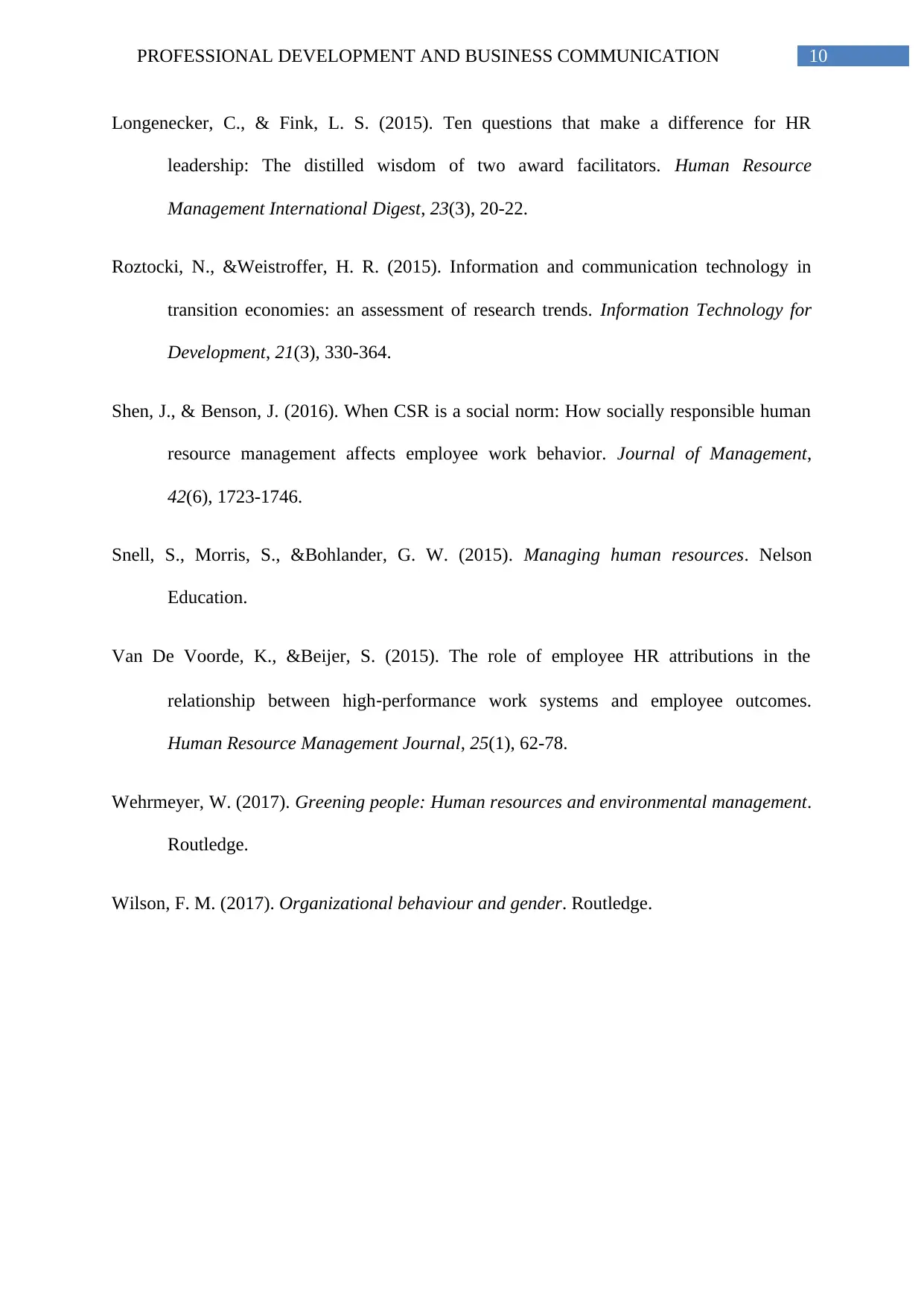
10PROFESSIONAL DEVELOPMENT AND BUSINESS COMMUNICATION
Longenecker, C., & Fink, L. S. (2015). Ten questions that make a difference for HR
leadership: The distilled wisdom of two award facilitators. Human Resource
Management International Digest, 23(3), 20-22.
Roztocki, N., &Weistroffer, H. R. (2015). Information and communication technology in
transition economies: an assessment of research trends. Information Technology for
Development, 21(3), 330-364.
Shen, J., & Benson, J. (2016). When CSR is a social norm: How socially responsible human
resource management affects employee work behavior. Journal of Management,
42(6), 1723-1746.
Snell, S., Morris, S., &Bohlander, G. W. (2015). Managing human resources. Nelson
Education.
Van De Voorde, K., &Beijer, S. (2015). The role of employee HR attributions in the
relationship between high‐performance work systems and employee outcomes.
Human Resource Management Journal, 25(1), 62-78.
Wehrmeyer, W. (2017). Greening people: Human resources and environmental management.
Routledge.
Wilson, F. M. (2017). Organizational behaviour and gender. Routledge.
Longenecker, C., & Fink, L. S. (2015). Ten questions that make a difference for HR
leadership: The distilled wisdom of two award facilitators. Human Resource
Management International Digest, 23(3), 20-22.
Roztocki, N., &Weistroffer, H. R. (2015). Information and communication technology in
transition economies: an assessment of research trends. Information Technology for
Development, 21(3), 330-364.
Shen, J., & Benson, J. (2016). When CSR is a social norm: How socially responsible human
resource management affects employee work behavior. Journal of Management,
42(6), 1723-1746.
Snell, S., Morris, S., &Bohlander, G. W. (2015). Managing human resources. Nelson
Education.
Van De Voorde, K., &Beijer, S. (2015). The role of employee HR attributions in the
relationship between high‐performance work systems and employee outcomes.
Human Resource Management Journal, 25(1), 62-78.
Wehrmeyer, W. (2017). Greening people: Human resources and environmental management.
Routledge.
Wilson, F. M. (2017). Organizational behaviour and gender. Routledge.
1 out of 11
Related Documents
Your All-in-One AI-Powered Toolkit for Academic Success.
+13062052269
info@desklib.com
Available 24*7 on WhatsApp / Email
![[object Object]](/_next/static/media/star-bottom.7253800d.svg)
Unlock your academic potential
Copyright © 2020–2026 A2Z Services. All Rights Reserved. Developed and managed by ZUCOL.
![University of [University Name]: Learning and Development Plan Report](/_next/image/?url=https%3A%2F%2Fdesklib.com%2Fmedia%2Flearning-development-plan-supply-chain-manager_page_2.jpg&w=256&q=75)



